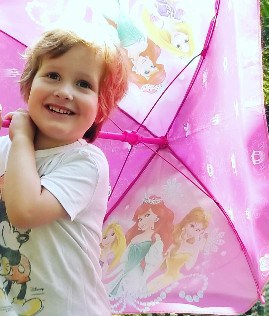When you get a difficult diagnosis, it can turn your world upside down. Even if you were expecting the news, an actual diagnosis forces you into a reality that is different from the one you’ve previously known. This is why receiving difficult diagnoses often lead people to experience grief. In this article, Jeanna Aarhus discusses her grief process, and ultimately finding tremendous joy, after her son’s Autism diagnosis. Jeanna, like many parents of differently abled children, now admits to feeling great shame in her initial response to learning that she was raising a child with autism. In this article, she shares her story and emotional transformation.
Jeanna is the mom of two children–Xander (almost four) and Lydia (one). She writes very openly for us about the joys and struggles of raising a child with autism. She also provides a useful list of of tips for parents struggling with a new diagnosis. Learn from Jeanna how to find joy in raising a child with autism…

This site contains affiliate links, meaning that we earn a small commission for purchases made through our site. We only recommend products we personally use, love, or have thoroughly vetted.
- Parenting Is Always Hard and Scary
- “Everything Is Amplified” When Raising a Child With Autism
- The Early Days of Developmental Delays
- Receiving Xander’s Autism Diagnosis at 15 Months
- Stages of Grief: Coming to Terms with Raising a Child with Autism
- The Mourning Stage
- A Revelation About Raising A Child With Autism and the Final Stage of Grief
- The Face of Autism: Learning from Auties
- Advice for Parents Raising an Autistic Child
- Jeanna’s 6 Tips for Finding Joy in Parenting an Autistic Child:
Parenting Is Always Hard and Scary
Nothing in this world can humble you like motherhood. You can read every book, attend every class, talk to other moms, and gain a false sense of knowing what’s up. You’re smart, capable, and you got this!
But the moment that fresh babe is placed on your chest, you’re just as ignorant and new to the world as the child you bore.
This is true, and stays true, no matter the temperament of your child. It’s true whether you’re raising a child with autism, a genetic condition like Jacob’s (read his story here), or a child who is developing typically.
Odds are you’ll be a deer in the headlights whether you have the most chill, sleep-through-the night “unicorn” (these babies are rare no matter what your Auntie and those church ladies tell you), or your baby wakes up eight times a night and screams its head off most of the day.
Being a parent is hard and scary.
“Everything Is Amplified” When Raising a Child With Autism
I have two children. One is neurotypical, which means she does not display signs of autism or other neurologically atypical patterns.
One is neurodiverse, which means he displays a variation of human neurological function–this is neither good nor bad as we understand it, but simply different.
In fact, the Autism Awareness Centre defines neurodiversity as “recogniz[ing] that all variations of human neurological function need to be respected as just another way of being, and that neurological differences like autism and ADHD are the result of normal/natural variations in the human genome.”
I have found that the worry and cluelessness of parenthood is amplified when you have a child with special needs.
Everything is amplified, including the fun parts of being a mom.
The Early Days of Developmental Delays
My oldest child, Xander, will be four years old in two months. He does not use verbal language to communicate, but instead uses sign language and PECS (Picture Exchange Communication System).
At his 15-month check-up, Xander’s doctor was concerned over his lack of babbling, so she ordered a hearing test.
Xander’s hearing was typical, so at 18 months, we began what is called Early Intervention Services. This involves a group of therapists and social workers who assess your child. They determine what they think the child needs and send specialists to your home to help your little one reach their goals.
At this time, raising a child with autism was on no one’s radar.
Everyone told me, including the specialists, that Xander was just a late bloomer.
He wasn’t ready to talk. He’s stubborn. You can read more about being a late speech bloomer in our article “Does My Child Need Speech Therapy?”
People (doctors included) told me that Xander was just taking it all in and did not feel the need to talk because all his needs were being met.
(Side note: this statement is insane. If that were true, most children would not speak.)
I was told to withhold food from Xander until he asked for it! Ignore him until he spoke! Can you imagine ignoring your child’s basic needs?
Receiving Xander’s Autism Diagnosis at 15 Months
This went on until Xander’s two year check-up when his pediatrician recommended we have him evaluated by a child psychologist.
His doctor mentioned autism, and my heart dropped.
Four months later, we received a diagnosis of level two on the autism spectrum, meaning moderate to severe.
It was one of the darkest times of my life, and looking back I realize how little I understood about autism spectrum disorder and how truly ableist I was.
I tell the rest of this story with shame in my heart.
Stages of Grief: Coming to Terms with Raising a Child with Autism
I have Generalized Anxiety Disorder and have seen a therapist for years. In therapy, I learned that, when a parent receives a mental or physical diagnosis for their child, the parent goes through the stages of grief.
Looking back, I was in denial at Xander’s 15-month appointment.
I knew Xander was differently wired from other children. He was an exceptionally difficult newborn and infant. He barely slept and wanted to nurse all the time (literally all the time). He wanted to be held constantly. At night he would cry, sometimes for hours.
My husband and I would take turns walking the floor with him while listening to music in our ear buds so we did not go insane.
I understand now that the crying and need for comfort could have been caused by any number of things. The lights in our house to a noise he did not like. But I told myself I was overreacting, which I tend to do.
Xander was fine. He’s normal! No worries!
After denial, my next emotions were fear, depression, and anger.
I was told I needed to place Xander in ABA therapy and more intense speech therapy if he “ever had a chance of being normal.”
We were told, he’s never going to live on his own if you don’t get him all these services that you can’t afford and insurance won’t cover.
We were told, go broke so your child has a chance at life!
I thought to myself and said aloud to my husband, “How can anyone possibly know what a 2 year old is going to be like as an adult? I know neurotypical 30 year olds still living with their parents! Why is that such a bad thing?“
The Mourning Stage
In my process of coping with the news that I was raising a child with autism, I mourned. I didn’t sleep. I binge ate and cried a lot.
I blamed myself, wondered if I ate something or took a medication while I was pregnant or breastfeeding. I read everything. Don’t do that. You’ll go insane.
I read articles that said vaccines were the cause of autism (editorial note: they’re not.). Lead paint, apparently, can cause autism. Fire retardants in breastmilk caused autism. Gut bacteria of the mother during pregnancy caused autism. Even bad parenting, apparently, causes autism! (Editorial note: Read sarcasm (correctly) in many of these frustrations, although there is evidence that some exposures, like heavy metals including lead, can lead to autism-like symptoms.)
I assessed every behavior of Xander’s and wondered if it was autism or if it was Xander.
I compared him to other children and cried myself to sleep thinking I would never hear Xander speak and never know certain things about him:
- What’s his favorite color?
- Does he understand what I’m saying to him?
- Will he ever make friends?
- Does he love me?
A Revelation About Raising A Child With Autism and the Final Stage of Grief
Weeks before his 3rd birthday, we were preparing for Xander’s party and getting him ready to start a program with the school system.
For the past year, I had expressed some of my fears to my mom. I’d had Lydia by then, which compounded my anxiety. Xander did not act like he enjoyed his new sibling. She cried a lot and took up Mama’s attention.
I told my mom some of my concerns over whether he would ever have a relationship with his sister. Whether Xander would ever be normal. My mom gave me a piece of advice that changed my life:
“Jeanna. Don’t worry about the future or compare Xander to other kids. Just enjoy your children. That’s the best thing you can do for your family.”
Her words felt like cool water splashed on my face after a long run.
Her words helped me reach acceptance, the final stage of grief.
Lost in worry, I had forgotten to appreciate Xander for who he is.
I was letting my preconceived prejudices about raising a child with autism, which I had not believed I was doing, cloud my judgement. I did not see the person behind the diagnosis.
The Face of Autism: Learning from Auties
I stopped reading essays written by specialists and started following blogs of autistic adults. The face of autism is diverse, it’s broad, and it’s beautiful.
I truly believe everyone has value and can contribute to the world in a positive way. If nothing else, auties (a term autistic author Donna Williams coined, and that the autistic community uses to describe themselves) in my life have made me a better person.
I learned to let go of spoken language and look at the world through Xander’s eyes.
Turns out his favorite colors are red, green, and blue. He knows how to count to 10. He can spell his name.
He loves his sister and wants to play with her, but she’s little, and he doesn’t understand how. He lines up colors ROYGBP.
He understands everything that is said to him, and knows if you’re talking about him. He appreciates people acknowledging him and his interests, even if he won’t make eye contact with them or even look their way.
He has friends in school. He even has a best friend.
He has a near photographic memory and knows the way to all his favorite places: school, the trampoline park, the McWane Science Center, the splash pad, and his speech therapist’s office.
“I No Longer Worry About Xander”
Xander is the sweetest child and feels empathy. (Yes, autistic people feel compassion. They are not robots. Since I’ve gotten on the right path with my own ableist thinking, I’ve taken it upon myself to educate others.)
I no longer worry is this Xander or is it autism. Autism is Xander. It’s a part of his journey, but not the only thing that defines him. His 14-month-old sister has more complicated verbal language than he does, and that’s okay.
When those moments creep in – and believe me, they do – where I mourn his lack of words or feel remorse for when he’s laughing and I’m not in on the joke, I try to stop myself. I appreciate the fact that he is laughing, and we are able to share his joy together.
We do not need words to know we love each other.
Advice for Parents Raising an Autistic Child
Whenever a new parent asks for advice, I only say two things:
- Be kind to yourself. This journey is harder and more rewarding than you ever thought possible, and it’s the most important job you’ve ever done. Don’t beat yourself up over mistakes, they’re lessons. You and your children are going to be great.
- No matter what type of child you have – neurotypical or neurodiverse, well or sick, cheerful or surly, enjoy your child.
Let go of worry, and appreciate your children for who they are. There’s no one else in this world quite like them, and they have so much to offer.
Jeanna’s 6 Tips for Finding Joy in Parenting an Autistic Child:
(1) When you receive a diagnosis, allow yourself to feel whatever emotions are happening in that moment. It’s okay to be confused, sad, fearful, even angry. And it’s okay to mourn the life you originally planned for you and your child. All emotions are valid.
(2) Specialists and experts are there for a reason, but they don’t know your child. Don’t do anything that does not feel right, and do not let them tell you who your child is.
(3) Listen to other autistic people. Follow them on Instagram, Twitter, or Tumblr. Get involved with your community and spend time with other autistic children and adults. Bring your child, but sometimes go alone, with your partner, or a support person. Learn who they are, what they need, and how they live their lives.
(4) Find your people. It’s okay to eliminate people, even family, from your life if they aren’t supportive. Find people who accept your family and all the chaos you bring.
(5) Go out. Schedule playdates, go to restaurants, take your child to the zoo, whatever works for you guys. I know it’s hard. Odds are you will experience a tantrum or a meltdown, people will stare, and you’ll end up sweating from nerves, but it’s okay. Let people stare and judge. You and your children deserve to be in the world. Isolating yourself will do no one any favors.
(6) This is for all parents: Enjoy the child you had. Maybe you’re big into sports, but your child is not athletic. Maybe you’re a bookworm, but your child hates to read. I think it’s natural for us to want our children to be like us, but they’re their own people…enjoy that person. Show interest in what they’re into even if you’re faking it.
What are your tips for experiencing the joy of raising an autistic child?










